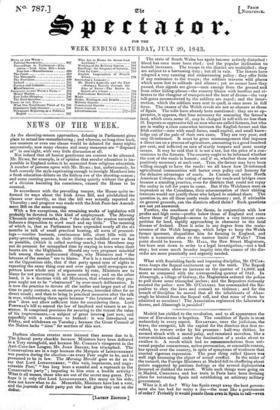The state of South Wales has again become actively disturbed
: blood has once more been shed ; and the popular inclination to tumult increases. The troops in the district are multiplied; they are subject to a harrassing duty ; but all in vain. The rioters have adopted a very cunning and embarrassing policy : they offer little if any resistance to the troops ; the soldiers traverse wild places which seem lost to solitude and silence ; yet no sooner have they passed, than signals are given—men emerge from the ground and from other hiding-places—the country blazes with bonfires and vi- brates to the clangour of trumpets and the beat of drums—the very toll-gates reconnoitered by the soldiery are razed ; and the insur- rection, which the soldiers were sent to quell, is once more in full force. The causes of the Welsh revolt are not so obscure as those of Spain. The tolls have already been mentioned : they are so op- pressive, it appears, that lime necessary for manuring the farmer's land, which costs some 51., may be charged in toll with no less than 6/. Imposts so oppressive fall on men who are called farmers, but who are in reality a.class somewhat between the English farmer and the Irish cottier—men with small farms, small capital, and small know- ledge out of the pale of their own caste. They are very poor, and very ill-informed. It must be gross mismanagement that imposes a direct tax on a process of agriculture amounting to a good hundred per cent, and inflicted on men of sturdy tempers and most scanty means. It may be said that it is not a tax, but the price of a con- venience to the farmers. The country ought to be informed whether the cost of the roads is honest ; and if so, whether those roads are positively necessary at such cost. True, the farmer may have been willing enough to have the roads : we all know how ill-informed agricultural communities will barter even policy and honesty for the delusive advantages of roads. In Canada and other North American Colonies, the voting of money for roads and bridges once became a standing practice, even for districts that could not repay the outlay in toll for years to come. But if the Welshmen were as imprudent as the Canadians, their misconception of their abiding interests would not justify those who helped to mislead them. The question is, are all these costly roads necessary ; and, if advisable on general grounds can the districts afford them? Such questions are not yet answered.
Further, the smallness of the firms, in conjunction with low profits and high rents—profits below those of England and rents above those of England—seems to indicate a very intense com- petition for land, rapidly approaching in character to the fatal disease of Ireland. Does it arise in any degree from the main- tenance of the Welsh language which helps to keep the Welsh farmer ignorant, disqualifies him for farming in England, and binds a numerous class to the narrow limits of Wales ? That point should be known. Mr. HALL, the Bow Street Magistrate, has been sent down in order to a legal investigation,—not a bad step ; but some much broader inquiry into the causes of the dis- order are more practically and urgently needed.


























